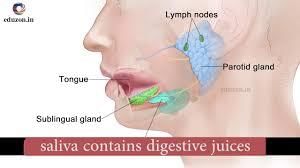Class 10 Exam > Class 10 Questions > What is the role of saliva in digestion?
Start Learning for Free
What is the role of saliva in digestion?
Most Upvoted Answer
What is the role of saliva in digestion?
The function of the saliva
- Chemical digestion breaks down starch by the function of “salivary amylase”
- Helps to chew and to swallow.
- Lubricating effect: moisturizes the inside of the mouth and creates smoother speech.
- Solvent effect: dissolves food and allows the tongue to taste the food.\
- The role of saliva in the digestion of food is explained below:It provides lubrication for chewing and swallowing the food. The watery liquid which is secreted by the glands present in the mouth is called saliva.When the saliva is added to food, it "moistens the food" and helps to create a "food bolus" which can be "easily swallowed". There is an enzyme called amylase, present in saliva which involves in breaking of starches into maltose and dextrin.

Community Answer
What is the role of saliva in digestion?
Role of Saliva in Digestion
Saliva is a watery fluid secreted by the salivary glands in the mouth. It plays a crucial role in the digestive process by breaking down the food we eat into smaller particles that can be easily digested and absorbed by the body. Let's take a closer look at the role of saliva in digestion.
Moistening of Food
Saliva moistens the food we eat, making it easier to swallow and digest. The moistening action of saliva also helps to prevent the food from sticking to the walls of the throat, making it easier to pass through to the stomach.
Enzymatic Action
Saliva contains enzymes such as amylase and lipase, which play an important role in the digestion of carbohydrates and fats respectively. Amylase breaks down the complex carbohydrates in the food we eat into simple sugars such as glucose, which can be easily absorbed by the body. Lipase, on the other hand, breaks down fats into fatty acids and glycerol, which can also be easily absorbed.
Buffering Action
Saliva also has a buffering action, which helps to neutralize the acidic environment in the mouth and stomach. This buffering action is important because it helps to protect the teeth and gums from damage caused by the acid in the food we eat.
Antibacterial Action
Saliva contains antibodies and enzymes that help to protect the mouth from harmful bacteria and other pathogens. This antibacterial action is important because it helps to prevent infections and other oral health problems.
Conclusion
In conclusion, saliva plays a crucial role in the digestive process by moistening the food, breaking down the complex carbohydrates and fats into simpler forms, neutralizing the acidic environment in the mouth and stomach, and protecting the mouth from harmful bacteria and other pathogens. Without saliva, the digestive process would be much more difficult and inefficient, making it harder for the body to absorb the nutrients it needs to function properly.
Attention Class 10 Students!
To make sure you are not studying endlessly, EduRev has designed Class 10 study material, with Structured Courses, Videos, & Test Series. Plus get personalized analysis, doubt solving and improvement plans to achieve a great score in Class 10.

|
Explore Courses for Class 10 exam
|

|
What is the role of saliva in digestion?
Question Description
What is the role of saliva in digestion? for Class 10 2024 is part of Class 10 preparation. The Question and answers have been prepared according to the Class 10 exam syllabus. Information about What is the role of saliva in digestion? covers all topics & solutions for Class 10 2024 Exam. Find important definitions, questions, meanings, examples, exercises and tests below for What is the role of saliva in digestion?.
What is the role of saliva in digestion? for Class 10 2024 is part of Class 10 preparation. The Question and answers have been prepared according to the Class 10 exam syllabus. Information about What is the role of saliva in digestion? covers all topics & solutions for Class 10 2024 Exam. Find important definitions, questions, meanings, examples, exercises and tests below for What is the role of saliva in digestion?.
Solutions for What is the role of saliva in digestion? in English & in Hindi are available as part of our courses for Class 10.
Download more important topics, notes, lectures and mock test series for Class 10 Exam by signing up for free.
Here you can find the meaning of What is the role of saliva in digestion? defined & explained in the simplest way possible. Besides giving the explanation of
What is the role of saliva in digestion?, a detailed solution for What is the role of saliva in digestion? has been provided alongside types of What is the role of saliva in digestion? theory, EduRev gives you an
ample number of questions to practice What is the role of saliva in digestion? tests, examples and also practice Class 10 tests.

|
Explore Courses for Class 10 exam
|

|
Suggested Free Tests
Signup for Free!
Signup to see your scores go up within 7 days! Learn & Practice with 1000+ FREE Notes, Videos & Tests.























